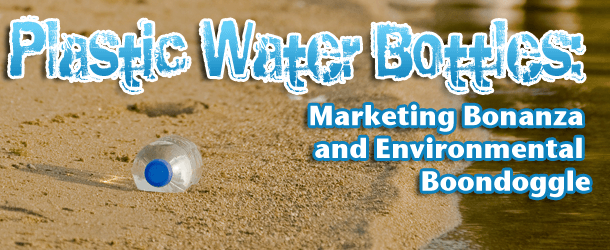
As I attended one of my children’s soccer games last Saturday and absorbed the fields full of children running and playing, one thing that jumped out to me was the amount of plastic water bottles at the park. They were everywhere; on benches, under benches, in people’s hands, on the ground, in trunks and back seats of cars, and overflowing in trash cans! Our soccer community was completely inundated with plastic water bottles. From one stand point, it is a marketing dream. At least 80% of the people at the field had either purchased bottled water or been given bottled water that had been purchased. On the other hand, our landfills might never recover.
Where did the love affair with plastic water bottles come from? Convenience and Health. These two words sum up the ability of intelligent, environmentally conscious individuals to partake in this deceitful marketing campaign. Bottled water is certainly convenient, and unlike French fries, the product is healthy. But, this is where the admirable qualities stop. The beauty is only skin deep.
Convenience and health cannot make up for the 1.5 million tons of plastic each year that is filling our landfills. The World Wide Fund reported that in 2009 8.45 billion gallons of bottled water were sold. These plastic water bottles not only leech phthalates into the water, but they take anywhere from 500 to 1000 years to fully decompose and return to the earth. Take a minute to reflect on that statement. The water bottle you are drinking from today will still be around when your grandchildren’s great, great, great grandchildren are born!
In addition to the water bottles, it took 89 billion liters of water in 2011 to fill all those bottles. Companies are always looking for new sources of water and new communities in which to build their plants. Although jobs are created, pumping the groundwater causes the underground watersheds to drop water levels. This affects the lakes, streams and wetlands. Not only does it affect the water levels, but it also affects the fragile ecosystems that make up these riparian areas. In Mecosta County, Michigan, water levels in a nearby stream dropped dramatically when Nestle built a water bottling plant.
To add insult to injury, this bottled water is not special, hard to find water. The major water bottling companies are bottling regular “tap “ water. Both Pepsi and Coke admitted that they are selling water that comes from public water sources (PWS). So, instead of filling up a reusable container with water, consumers are paying money to purchase tap water in non-eco friendly containers that are filling the landfills at an alarming rate!
“Aquafina” water, one of Pepsi’s popular brands of water, has a picture of beautiful mountains on the label. One would think they were drinking water from the mountain streams. But no, it is the same water that you and I get when we turn on our water spigot. Clearly, beauty is only label deep!
– Linda Ingham
As a mother of five, licensed attorney and fitness nut, Linda Ingham enjoys writing about many subjects, including law, gardening, health and fitness, child rearing and travel. Check out her articles at www.pathacross.com

